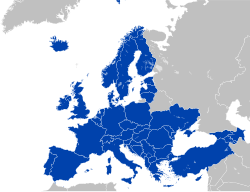Outcomes
Future summits
According to a press release issued after the summit, the main focus of discussions was in regard to security, the 2022 Russian invasion of Ukraine and the ongoing energy crisis in Europe. It was also agreed that the following summit will be held in the spring of 2023 in Moldova and would focus on securing key infrastructure such as pipelines, cables, and satellites; stepping up the fight against cyberattacks, creating a support fund for Ukraine, working out a common, pan-European energy policy and looking into the possibility of having more university and student exchanges. [5]
United Kingdom
At the summit, the United Kingdom agreed to re-engage with the North Seas Energy Cooperation (NSEC) which it had previously left in January 2020. [8] [9] [10] At a fringe event, British Prime Minister Liz Truss committed to joining the Permanent Structured Cooperation (PESCO) and its Military Mobility programme. [11] [12] [13] The summit also resulted in a resetting of the relations between the UK and France. During bilateral talks at the summit, Liz Truss and French President Emmanuel Macron reaffirmed the strong and historic ties between their two countries and the two agreed to hold a UK-France Summit in 2023. [14] [12] Prior to the summit, Truss had stated that "the jury was out" on whether Macron was a friend or foe, however during the summit Truss called Macron a friend. [15]
Common youth policy
At the summit, the leaders of Albania, Serbia and Ireland suggested the idea of having a much more integrated university policy. [16]
This page is based on this
Wikipedia article Text is available under the
CC BY-SA 4.0 license; additional terms may apply.
Images, videos and audio are available under their respective licenses.






